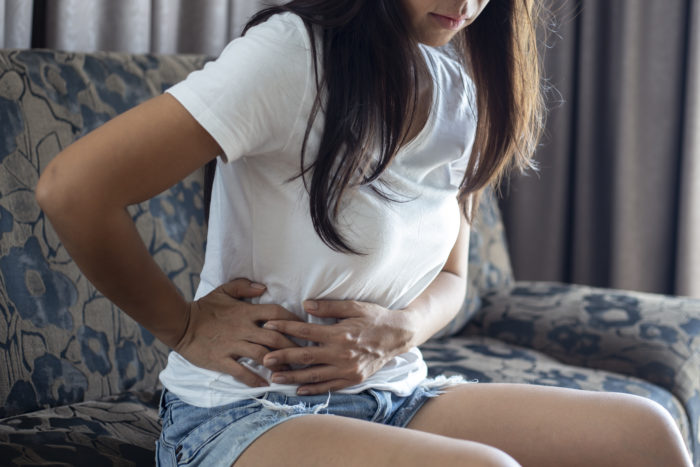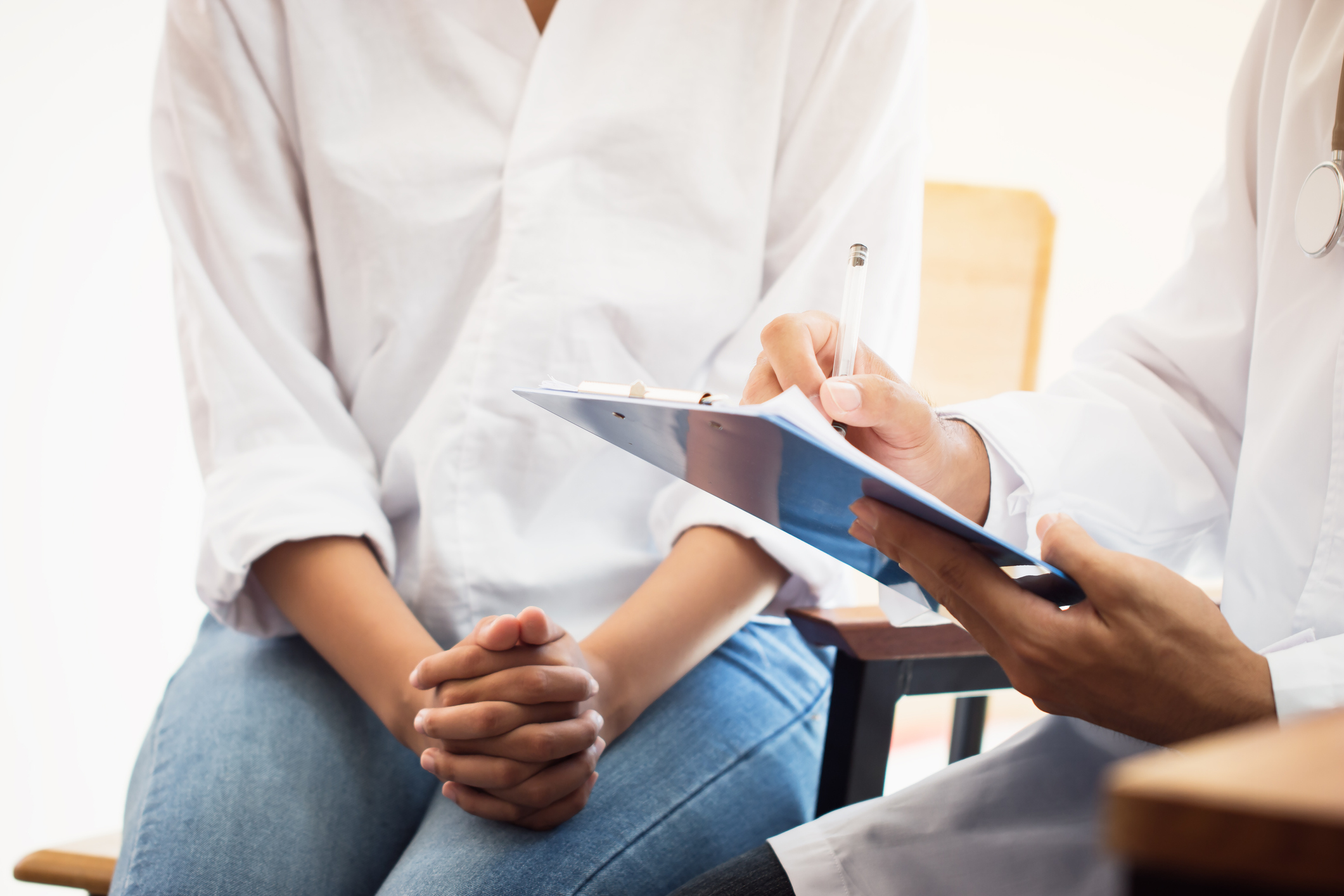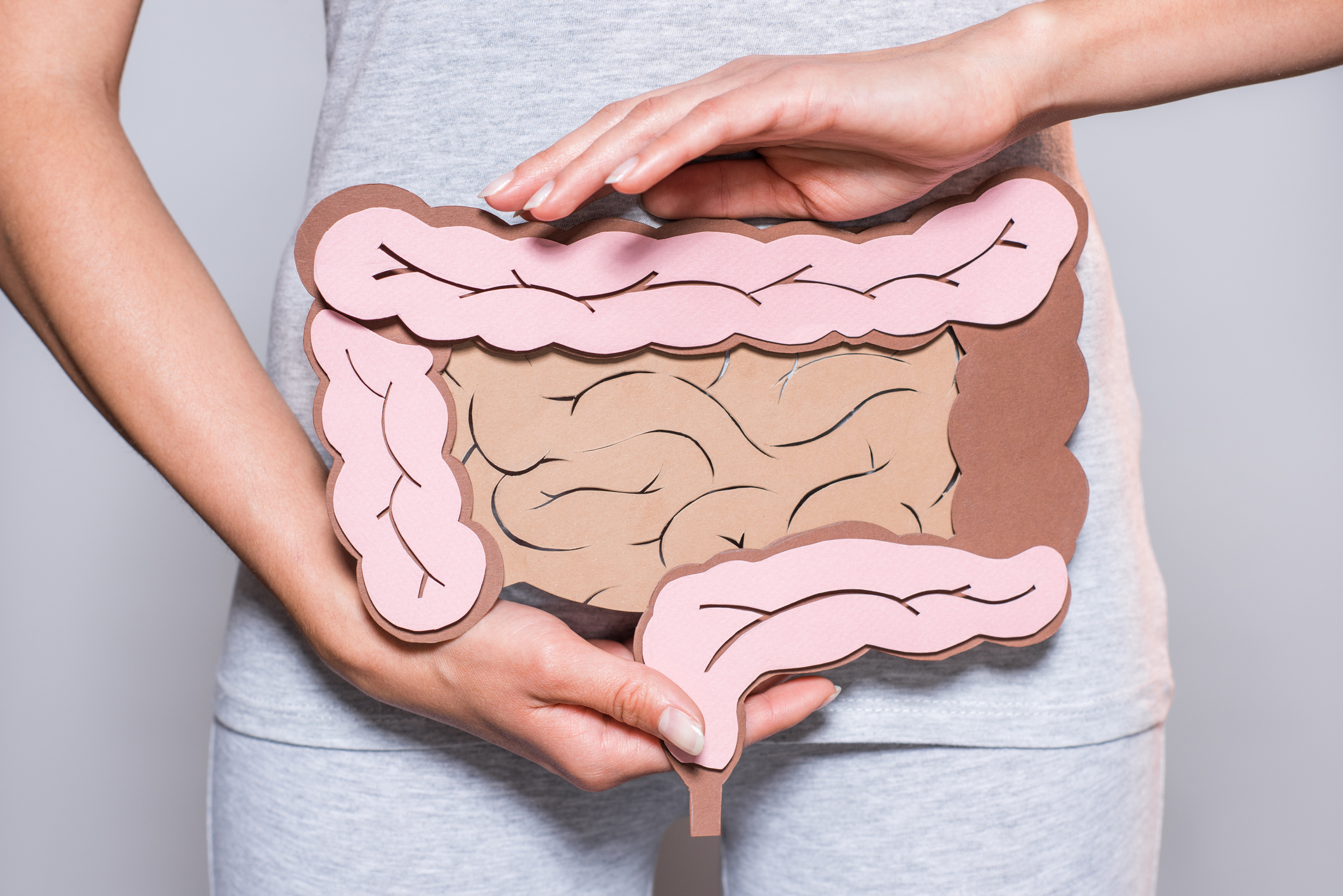Endometriosis has long been treated as simply a hormonal imbalance. But recent research suggests that your gut health, immune system function, and hormone balance all play a role in the development and progression of endometriosis.
This new, expanded understanding of this widely misunderstood and under-researched condition can help practitioners provide alternative treatment options for countless women.
By viewing endometriosis as more than just a hormonal condition, we can look at the health of the entire body and how it plays a role in the development and management of this condition.
My Fed and Fearless™ method for helping women heal their body, mind, and spirit acknowledges that nothing in our body happens in a vacuum.
A stressor that affects us mentally and emotionally can also have downstream impacts on our digestive and adrenal health. And a hormonal imbalance can actually show up as a gut condition or as troublesome skin issues.
My approach to the management of a complex condition like endometriosis is no different.
Our body is more interconnected than we realize. When we understand this, we can move from just dealing with a condition like endometriosis, to actually finding symptom relief and healing.
Keep reading to learn how endometriosis is far more than just a hormonal imbalance, and how you can start finding relief using simple diet and lifestyle changes today!

What is Endometriosis?
Endometriosis is a condition that affects millions of women. This condition affects 20-50% of infertile women, and as many as 71-87% of women with chronic pelvic pain.
And it’s also one that we, unfortunately, don’t know much about.
This painful condition is characterized by the implantation and growth of endometrial tissue (your uterine lining) outside the uterus.
Some women with endometriosis have minimal symptoms, perhaps only slightly more painful or heavier menstrual periods than normal. But, for many women, endometriosis is a debilitating condition that greatly affects their quality of life.
Common symptoms of endometriosis are:
- Pelvic pain that usually worsens significantly around menstruation
- Pain and cramping during sex
- Infertility
- Bleeding or spotting between periods
- Digestive issues (diarrhea or constipation, bloating, nausea – especially during your period)
- Chronic fatigue
- Low back pain
The root causes of endometriosis vary from woman to woman. With this sort of variability from woman to woman, combined with a general lack of study on women’s health conditions (especially in black women), it’s no wonder this disorder is not very well understood.
It is likely, however, that endometriosis occurs as a result of a combination of genetic and environmental factors. These two in combination with an imbalance in our hormonal, immune, or gut health can lead to the perfect storm for endometriosis.
There is currently no cure for endometriosis. But there are some highly effective steps you can take to reduce your symptoms and live vibrantly with this condition.

Endometriosis as More Than a Hormonal Imbalance
Previously, practitioners believed endometriosis to be strictly related to hormonal imbalances.
This is likely why the common “treatment” (if we can call it that) for this condition is to go on some form of hormonal birth control.
While getting on the pill certainly can relieve some symptoms of endometriosis, and can be extremely beneficial for pain management, it’s not an effective treatment for the root cause.
Here’s why.
Endometriosis is NOT simply a hormonal condition. New research has shown that the development of endometriosis is likely related to a combination of:
- hormonal fluctuations
- immune system dysregulation
- and imbalances in the gut
It’s likely that endometriosis results from a perfect storm of dysregulation of these body systems along with genetic and environmental factors.
Endometriosis is certainly affected by and dependent on estrogen. But, simply viewing this condition as only mediated by hormonal changes keeps us from getting to the root cause and helping women find relief.
It’s important to focus on healing all three of these body systems. Along with identifying any environmental factors that may be playing a role in the development of this condition.
Let’s dive into the science behind these known contributors to endometriosis. This way we can better understand what causes endometriosis and get started on the road to recovery.

Endometriosis and Hormonal Imbalance
I just told you that endometriosis is more than a hormonal imbalance. But that doesn’t mean hormones don’t play an important role in this condition. It just means that they’re not the ONLY factor at play.
Endometriosis is an estrogen-dependent disease. This condition develops mostly in women of reproductive age and resolves after menopause. These factors alone make it pretty clear that hormones do play a role.
Estrogen is responsible for thickening the endometrial lining with your monthly menstrual cycle. There is also evidence that the endometriosis lesions which develop in other areas of the body contain estrogen receptors.
This suggests that estrogen does, in fact, stimulate the growth of this tissue.
Estrogen dominance in women is often thought to be one precursor to potentially developing endometriosis.
As with any case of estrogen dominance, having endometriosis doesn’t mean that your estrogen is too high. The development of endometriosis could also be a result of progesterone that is too low in comparison to estrogen levels.
Progesterone also works to inhibit the growth of endometrial tissue. Progesterone that is too low along with estrogen that is in excess can contribute to endometriosis.
These hormonal imbalances can cause endometrial tissue to develop more rapidly and more abundantly than normal. This can mean more pain and discomfort in the days leading up to and during your menstrual period.
This hormonal component is why many doctors prescribe hormonal contraceptives for the management of endometriosis.
But just because you have symptoms of estrogen dominance, that doesn’t automatically mean you’ll get endometriosis. There are genetic and environmental factors at play that affect your susceptibility to developing this condition.

Endometriosis and Immune Imbalance
New research is showing that the health of our immune system can play a large role in endometriosis.
In fact, some researchers are suggesting that endometriosis may actually be an autoimmune disease.
The exact specifics of the immune system’s role don’t really matter. But we do know that when the immune system is out of balance, genetically susceptible women are at a greater risk for developing endometriosis.
The main players in the immune dysregulation behind endometriosis seem to be immune cells that aren’t functioning normally.
In endometriosis, these dysfunctional immune cells both fail to remove the excess endometrial tissue as well as contribute to the chronic pelvic and systemic inflammation seen with this condition.
Our sex hormones, estrogen and progesterone, also play a role in the inflammation associated with endometriosis.
If those hormones are imbalanced, it’s also likely that we’ll have an imbalanced inflammatory response in relation to our endometrial tissue.
And the growth of excess tissue, as a result of this imbalanced inflammatory response, also results in more inflammation. This starts the vicious cycle of inflammation and endometrial lesions that characterizes this chronic condition.
It’s currently unknown whether the inflammatory connection to endometriosis is a cause or a result of the condition. But it is clear that women who develop endometriosis have an increase in inflammation, both locally and systemically.

Endometriosis and Gut Imbalance
More than 70% of our immune system is housed in our gut. So we can’t discuss immune health without taking a deeper look into digestive health as well.
Plus, the health of our gut, specifically our gut bacteria, has a strong impact on the health of our hormones.
That’s why gut health plays a strong role in the development and progression of endometriosis.
Would you like to save this post?
Your email address is 100% safe and will never be sent spam.
Just like your gut has a microbiome, your vaginal canal has one too. And an increase of pathogenic bacteria in the vaginal canal has been observed in women with endometriosis.
This imbalance of bacteria seen in the vagina and endometrial tissue may play a role in the immune dysregulation and localized inflammation that is common in endometriosis.
Again, it’s hard to know which came first – the endometriosis or the imbalance of bacteria. But our vaginal flora is relevant to the development of this condition.
This imbalance of bacteria, along with a similar imbalance in the gut, can lead to increased levels of circulating estrogen. And as you now know, the development and progression of endometriosis is strongly associated with higher than normal estrogen levels.
Leaky Gut and Endometriosis
Another study showed that the menstrual blood of women with endometriosis showed four to six times more bacteria than women without the condition. It’s likely that this bacteria migrated from the gut.
Bacterial translocation outside the gut is more likely to occur when intestinal permeability is present.
Intestinal permeability, or “leaky gut,” occurs when the junctions that hold the cells of your intestinal wall lose their connectivity. The gut lining is no longer acting as a barrier.
This allows bacteria to escape to other parts of your body. And in the case of endometriosis, it appears that some gut bacteria is relocating to the endometrial lining.
Understanding that bacteria likely play a role in endometriosis is a huge step in the development of new and better treatment options.

A Holistic Approach to Managing Endometriosis
Research clearly shows that endometriosis is much more complex than just a hormonal imbalance.
Our hormones, immune system, and gut health all play an integral role in the development and continuation of this condition.
In order to successfully reduce the severity of endometriosis, we must improve the health of these body systems as a whole.
Here are some simple diet and lifestyle interventions that you can use to improve the health of your hormones, immune system, and gut. Finding improved health in these areas may, in turn, improve your endometriosis
These are just general recommendations. Endometriosis, as I’m sure you’re beginning to understand, is a complex condition. Working with a trusted professional one-on-one is the best way to successfully treat this disorder.

Supporting Hormone Health
Endometriosis is an estrogen-mediated condition.
Lowering estrogen levels and increasing progesterone can help reduce symptoms and the recurrence of endometrial lesions.
Some natural ways to help your body balance hormone levels include:
- Improve detox and elimination capabilities with a diverse variety of plant foods
- Trying seed cycling
- Reducing your exposure to xenoestrogens
- Stopping hormonal birth control (This can be difficult with endometriosis, so always talk to your doctor before getting off the pill.)
- Getting more consistent sleep
By implementing these simple lifestyle changes, you’ll give your body the best baseline for producing balanced hormones.
If you want help figuring out the best diet and lifestyle changes to balance your estrogen and progesterone levels, I’d love to work with you!

Supporting Immune System Health
An anti-inflammatory diet is your best bet for supporting your immune response in relation to endometriosis.
Eliminating potentially inflammatory foods, like gluten, dairy, eggs, and soy, is a great way to start reducing symptoms through diet alone.
These foods can trigger your immune system if you’re sensitive. And if your body reacts unfavorably to them, this immune response can exacerbate your endometriosis symptoms.
Important note: not everyone will react with an immune response to these foods.
Trying a short term elimination diet like a Paleo reset or even the Autoimmune Protocol (AIP) can help you find the foods that you react to specifically.
Studies have shown that the Low-FODMAP diet can also be helpful in reducing symptoms of endometriosis. This is likely due to the relationship between our gut bacteria and this condition, rather than a direct inflammatory response.

Supporting Digestive Health
Digestive health can influence both our hormonal and immune health. Working to support this body system is going to be extremely valuable as we’re trying to reduce symptoms of endometriosis.
Taking a probiotic supplement or increasing your intake of probiotic and prebiotic-containing foods is a great way to start improving your gut health with endometriosis.
Bacterial imbalance in the gut is strongly related to bacterial imbalance in the vaginal canal. So getting your gut microbiome healthy again is a good place to start.
Working to heal leaky gut can also go a long way in improving your gut health with endometriosis.
Supplements like anti-inflammatory turmeric, gut supporting zinc, and healing collagen are great ways to reduce your intestinal permeability.
Working with a trained practitioner to create a protocol tailored to your unique needs is necessary for the best results. And it’s critical to test – not guess – when it comes to identifying gut dysfunction and dysbiosis.
You can work with me if you’re interested in exploring how you can better support your gut when dealing with endometriosis.

The Bottom Line on Endometriosis
Endometriosis is a complex condition that is usually intertwined with our hormonal health, immune response, and gut function.
It can occur when one or more of these body systems are imbalanced. Especially when combined with a genetic predisposition.
Gone are the days of thinking that endometriosis is simply a hormonal condition. No longer is prescribing the birth control pill the only way to find relief.
By working to balance each of these three body systems, you can find healing and recovery from this debilitating condition.
There is hope for relief from endometriosis. By taking a holistic approach to this condition, we can do far more than just cover up symptoms and suppress natural hormonal function.
And while natural treatments can be effective, they’re usually most effective in combination with conventional endometriosis treatments. Working with a trusted medical professional is the best way to find relief and start working towards true healing from this condition.
If you’re struggling with endometriosis, I’d love to help you bring your body back into balance as a starting point. When you work with me, we’ll find a path to heal your body from a holistic perspective – body, mind, and spirit.
What about you? Have you had success with any of these diet and lifestyle tips mentioned in this article? Or have you found other ways to manage your endometriosis symptoms? Share your experience in the comments!
Please Note:
I no longer offer 1:1 nutrition or functional health services, and I’m not accepting new clients for digestive or hormone-related support.
This blog remains published as a helpful resource for women navigating these health challenges — especially those looking for clarity around their symptoms and well-being.
Today, my work is dedicated to helping Health Coaches, Practitioners, and Wellness Entrepreneurs grow profitable, sustainable businesses through private practice coaching and mentorship.
If you’re a health and wellness professional who’s ready to grow a thriving, values-aligned business without burning out, click here to learn more about my coaching programs.
Thank you for being here and I wish you the best on your journey.
This post may contain affiliate links. If you click on a link and make a purchase, I may receive a small commission.

+ show Comments
- Hide Comments
add a comment